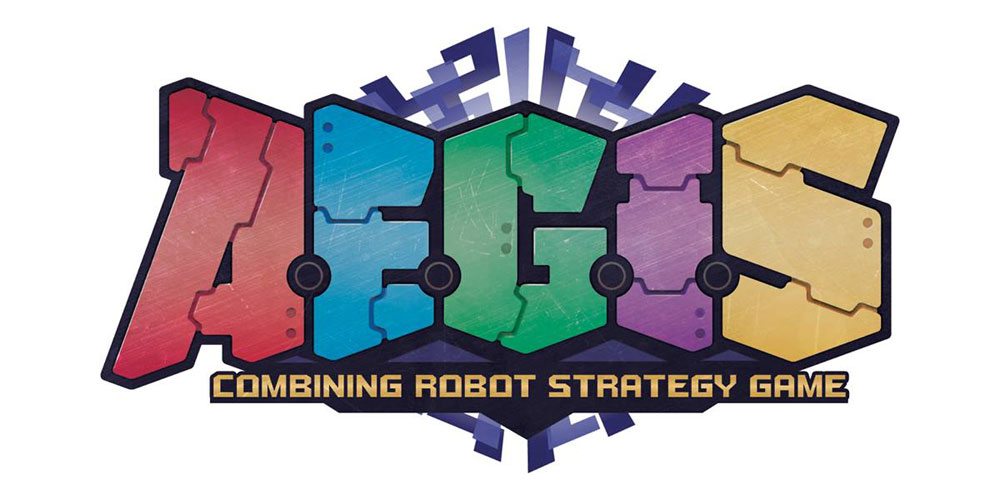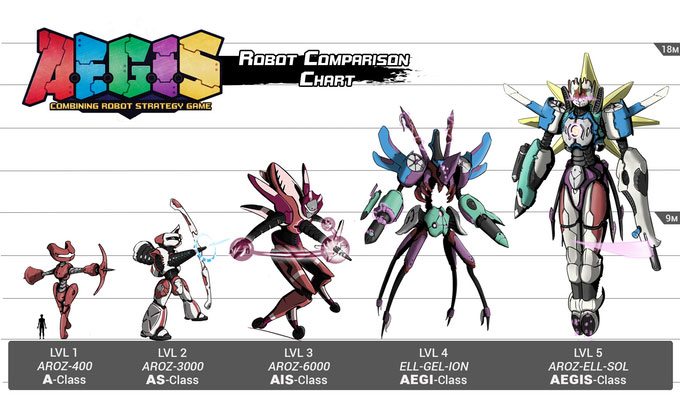I’ve got several more Kickstarter tabletop projects to share with you later this month—with the Spiel gaming convention happening in Essen, Germany, this weekend, a lot of people are using that opportunity to launch projects. For now, though, here are a few that got my attention but for various reasons I can’t do a full review.
A.E.G.I.S.: Combining Robot Strategy Game
That’s right: combining robots. For many of you, that’s probably enough of a hook that you’ll go back this game right away. I first got a short glimpse of it at Gen Con this year, and I did get a prototype but unfortunately only had the chance to play it once so far—and now that the campaign is live I didn’t want to wait too much longer.
A.E.G.I.S. is a war game, where you move your robots around on a hex-based board and try to take out the other teams—and, of course, each unit has its own stats and abilities. The trick, of course, is that you can combine two or more units into a single, larger robot. Each of the robot classes (Assault, Evasive, Guard, Intel, and Support) has its own particular strengths: for instance, the A-class tends to have short range attacks and use more energy. S-class, on the other hand, tends to hang back with long-range weapons and generates more energy for the team. There are several unique robots to choose from for each class, too: 80 robots in all between the two core sets offered in the Kickstarter campaign.
To play, you’ll build your team of five robots—use the pre-built sets, or build your own, or draft a team—and face off against up to three opponents. You also get to pick some Level 2 and higher robots for your Combine Pool: these are advanced forms that require using multiple robots from different classes. For instance, an I-class and S-class could combine into a Level 2 IS-Class, which shares traits with each. As with the Level 1 robots, there are a few versions of each Level. Your five basic robots don’t have to be the five different classes, either. You could have A, G, G, I, I—but that also limits the types of robots you can combine into.
Your goal is to eliminate the other teams or prevent them from generating energy (each active robot produces energy on its turn). The trick is using your team’s abilities well and knowing when to combine robots—because combining also means you have fewer units on the battlefield. I love the artwork and the theme, though I generally don’t play a lot of games of this type. There are two core sets offered: Arc Buster and Sky Guard, each with its own set of 40 robots.
This one’s just got about a day left, so if it looks interesting, you should check it out soon. Button Shy has had a whole line of Wallet games: these are micro card games that come in little “wallets,” making them very portable and great for on-the-go gaming.
Ahead in the Clouds is a two-player game set in a floating city; you collect and manipulate resources in order to fulfill certain contracts. Because of the nature of the floating city, you can connect buildings to your own home base to use them—but if you have to pass through your opponent’s base, they get some resources, too. The trick is that it costs actions to disconnect a building (or cause a Cloudburst, breaking apart the entire network), so you have to balance using your actions to reconfigure the city vs. making use of the connections that are already there.

It’s a cool idea and has a sort of puzzle-like aspect to it as you try to make the most of your limited action points to get the resources you need. But be quick: the campaign ends on Saturday!
If you’re a child of the ’80s, just go ahead and slap your money down for this one like I did—the packaging alone is worth the price, with its VHS-box-set aesthetic and those extra Zs in the name. But it’s not just a pretty face. This game uses a mechanic a little like Wings of War and X-Wings Miniatures, where you program your moves around the table, trying to collect the prisms. But you also get a little bit of Tron light cycle action, because you leave a trail behind you as you move, so you have to watch that you don’t crash!
I heard about this one at Gen Con this year but, alas, didn’t get a chance to play a demo myself, but it looks like a lot of fun, and I can’t wait. Plus, it’s being published by Greater Than Games, and they have a pretty good track record with Kickstarter campaigns.
This quick-playing card game has you competing for fantasy real estate: Elven treehouses, Dwarven taverns, and the glorious enchanted castle. Players draft cards from the proposals in the center of the table, and leftover proposals go into the scrap pile. But the trick is that you can only score if there are cards in the scrap pile—the more, the better. It’s a tricky game of set collection and knowing just the right time to cash in some cards for points.
Unreal Estate has already funded and has added a lot of goodies through stretch goals, including a custom airship meeple and a lot more special buildings with interesting effects. Watch for a more in-depth review from GeekMom Samantha Fisher coming soon!







